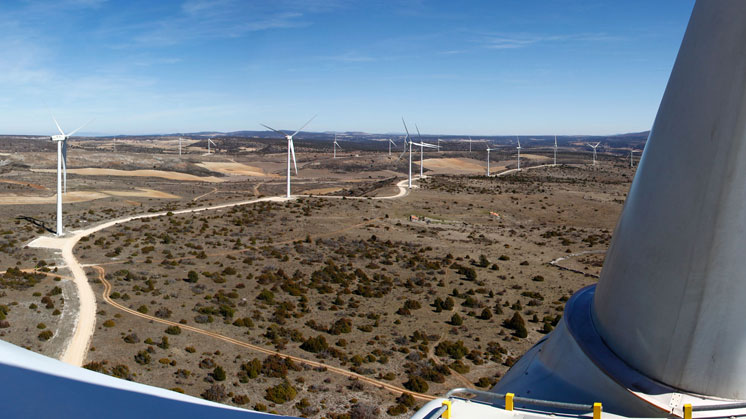Iberdrola uses blockchain to guarantee that the energy it supplies to consumers is 100% renewable
- This first experiment, conducted with Kutxabank, allows the supply of energy to be tracked in real time from the generation asset to the customer
- This technology contributes to decarbonisation: it provides efficiency, flexibility, transparency and savings to the Guarantees of Origin (GoO) process
Iberdrola has completed a project that will contribute to accelerating the decarbonisation process by using blockchain technology to guarantee that the energy supplied to the consumer is 100% renewable. This first experiment to guarantee the renewable origin of the energy supplied, was done with the financial entity Kutxabank, which was able to track, in real time, the origin of the energy supplied by Iberdrola from the generation asset to the point of consumption.

The renewable energy was generated in the Oiz (Biscay province) and Maranchón (Guadalajara province in the Castile-La Mancha region) windfarms and the San Esteban hydroelectricity plant (Orense province in the Galicia region). The clean energy from these assets was then consumed at the headquarters of Kutxabank in the Basque Country and Cajasur in Córdoba.
Traceability, immediacy and cost savings
Blockchain technology is an efficient way of allocating which assets will supply energy to a specific point of consumption, and can even be used to establish a hierarchy of priorities when it comes to sources of origin. It also eliminates intermediaries as it uses smart contracts which automatically come into effect when both parties fulfil their side of the agreement, simplifying the process, eliminating costs and improving privacy.
With this initiative, renewable energy certification processes are accelerated and automated, certification is given a greater degree of traceability, and the transaction is made more transparent and secure, as it is permanently registered on the platform so that both parties can audit the results.
According to Iberdrola, "this innovation shows us that it is a crucial catalyst in the process of decarbonising the economy, allowing traceable, secure and rapid transactions. In this case, the supply of green energy is more efficient, flexible and transparent, which incentivises the production and consumption of 100% renewable energy."
For Kutxabank, it is "a new opportunity to keep advancing in the sustainability criteria which guide our activity, as we have spent years developing multiple actions, both directly and indirectly, to minimise our environmental footprint. New technologies are proving to be a powerful ally when it comes to improving knowledge about the source of the energy we consume as we aspire to become completely renewable in the near future."
To carry out this initiative, Iberdrola was supported by Energy Web Foundation, a scaleable, open-source blockchain platform designed for the regulatory, operational and market needs of the energy sector.
It has also designed a user-friendly web environment which lets customers view data on the process and identify which plants the green energy they consume comes from.
Green energy and big companies
Guaranteeing the renewable origin of energy is critical for long-term PPAs (power purchase agreements), associated with the growth of the corporate green energy market. In July, Iberdrola and Kutxabank entered into a long-term PPA for the supply of electricity from renewable assets. In this case, the energy will be supplied from the Núñez de Balboa solar plant that Iberdrola is building in Extremadura, the largest solar project in Europe.
Blockchain initiatives
Iberdrola has implemented several initiatives using blockchain. For example, the company is participating along with other companies in the sector in a project to try out blockchain-based transactions in wholesale energy and natural gas markets.
This initiative allows peer-to-peer transactions to be carried out without the need for intermediaries. These agents will buy and sell energy directly, without a regulated market, and their transactions will be registered on the platform anonymously and in encrypted form to be verified by other operators.
In its distribution business, blockchain initiatives are mainly aimed at certifying information about network events with the potential to have an impact on customers. This is a big step forward not only in the network digitisation process, but also in areas of service quality and customer service.
